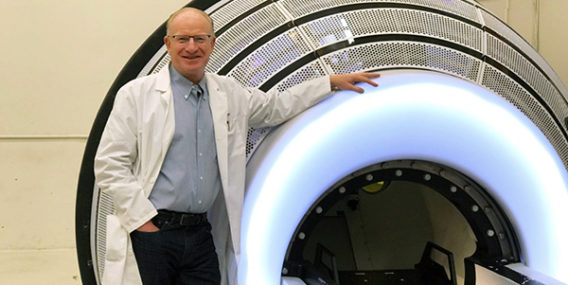By Stacey Paris McCutcheon
Scope, the Stanford Medicine blog, recently profiled JOHN ADLER, a neurosurgeon and innovator whose desire to help patients has led him down an entrepreneurial path multiple times.

Neurosurgeon John Adler (Photo by Cece Torres)
Speaking recently at the 20th Annual Fogarty Lecture, an event co-sponsored by the Stanford Byers Center for Biodesign, Adler said that bringing new medical technologies from an idea into patient care is the hardest thing he’s ever done.
“Don’t do it to make money,” he cautioned the audience. “Do it because you’re passionate.”
Adler’s entrepreneurial journey began after a fellowship with Swedish physician Lars Leksell, whose Gamma Knife made it possible to non-invasively treat deep brain lesions using targeted radiation beams. The treatment relied on an external frame bolted to the patient’s skull to precisely orient the beams so that they left surrounding healthy brain tissue unscathed.
Adler had an insight about a way to make the treatment even better for patients. Adler worked with the Department of Engineering to prototype what became known as the Cyberknife® Frameless Stereotactic Radiosurgery System. He also started a company to commercialize his invention and bring it into patient care. Today the Cyberknife has been used to treat more than 1 million patients.
But Adler didn’t stop there. “Cyberknife was a breakthrough therapy,” he said. “It is fast, highly effective, painless, and low risk. But although there are more than 2 million patients every year with head and neck tumors who need radiosurgery, only around 150,000 of them ever get it.”
Motivated to make radiosurgery more accessible, Adler began to conceptualize another treatment system – one that was low energy and self-shielding so that it didn’t require a radiation-proof facility, with advanced, easy-to-use software that was optimized for neurosurgeons, but could be used by any radiation therapist. After trying for two years to develop his technology without launching a company, Adler reluctantly found himself at the helm of another start-up. The new product, the Zap Surgical System, received regulatory approval in September 2017 and is now preparing for its launch into patient care.
While Adler’s calling will always be his role as a physician, he sees entrepreneurship as a mechanism for helping patients on a larger scale. “I am committed to breaking down barriers and improving the patient experience,” he said.
Read more in Scope.
